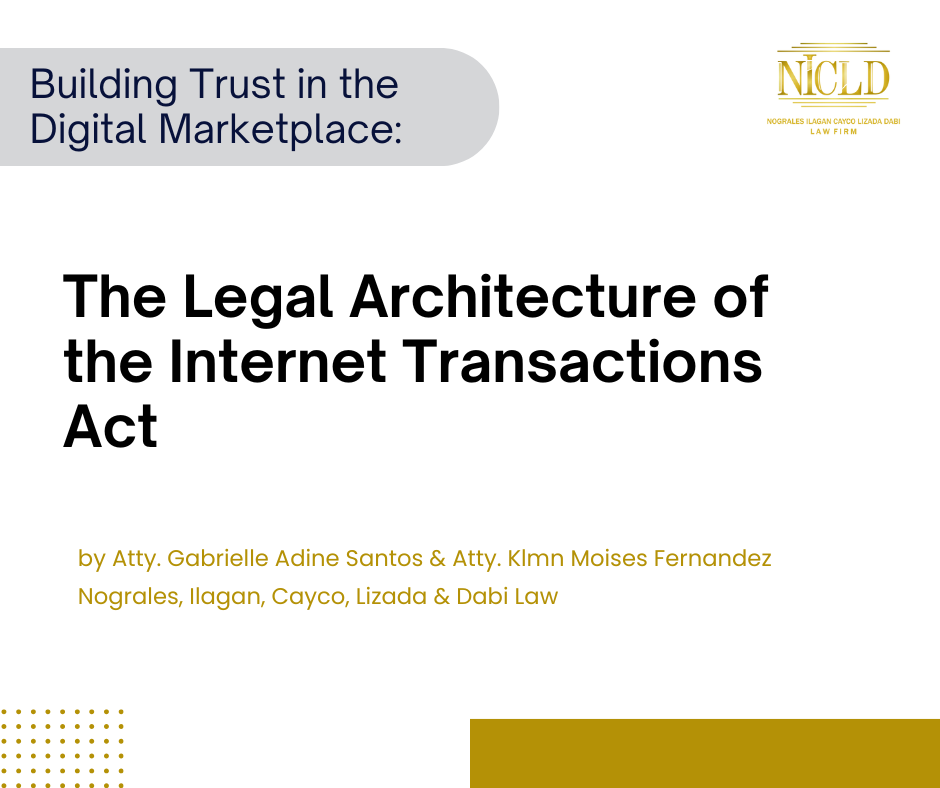The Philippines is embracing the opportunities of a connected society by pursuing digital markets. To support this shift, a strong legal framework for online transactions is crucial. Taking the lead is Republic Act No. 11967, known as the “Internet Transactions Act of 2023”(“ITA”). This key legislation provides a clear structure for online commerce, setting out the obligations, liabilities, and penalties for merchants and platforms, creating a more secure and reliable digital marketplace.
The ITA is primarily designed to protect consumers in online transactions. It builds on the Consumer Act of the Philippines while introducing new protections suited to the digital age. With strict rules on accountability and dispute resolution, the law boosts trust in e-commerce and discourages fraud. The guidelines issued for business to business (B2B) and business to consumer (B2C) transactions reduce risks, prevent unfair practices, and create a trustworthy online marketplace. However, consumer to consumer (C2C) transactions are excluded, as they are not part of regular commerce. The ITA applies when one party is situated in the Philippines, or when a digital platform, e-retailer, online merchant avails of the Philippine market.[1]
The ITA has corresponding implications for e-commerce platforms, logistics providers, and small to medium-sized enterprises (SMEs) seeking to expand their digital presence. Its most notable provisions are the following:
- Merchant Accountability – Online merchants and e-retailers are primarily liable for indemnifying consumers in civil and administrative complaints arising from internet transactions.[2]
- Platform Liability – Digital platforms and marketplaces may be held subsidiarily or even solidarily liable with merchants if they fail to exercise due diligence, ignore takedown notices, or facilitate transactions with sellers lacking a legal presence in the Philippines.[3]
- Civil Code Applicability – The law reinforces that obligations and rights under the Civil Code on Sales and Contracts apply equally to online transactions.[4]
The ITA backs its rules with a structured schedule of fines and enforcement measures:
- Deceptive or unfair practices and non-compliance with takedown orders – Fines range from ₱20,000.00 to ₱1,000,000.00, depending on the number of offenses.[5]
- Violations tied to the value of goods/services – Penalties range from ₱100.00 up to ₱20,000.00, scaled to the transaction amount.[6]
- Violations of the other obligations imposed on e-marketplaces, digital platforms, online merchants, and other obligations – Fines range from ₱5,000.00 to ₱10,000.00 for first offenses, and up to ₱100,000.00 for repeat violations.[7]
By balancing consumer protection with legal remedies, the ITA advances online trade. For consumers, it ensures transparent and secure transactions. For businesses, it offers a clear regulatory framework that not only reduces risks but also fosters competitiveness in the digital economy. Ultimately, the ITA is more than just a compliance requirement—it is a strategic opportunity. Companies that align their practices with the law will avoid penalties, strengthen their reputation, boost consumer confidence, and gain a competitive edge.
